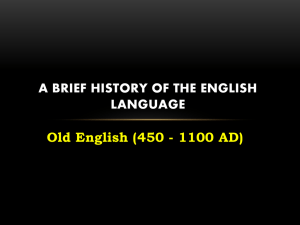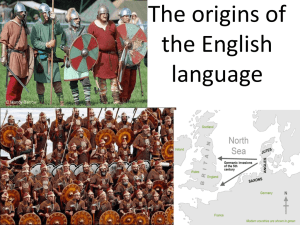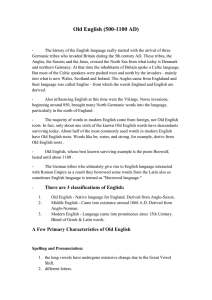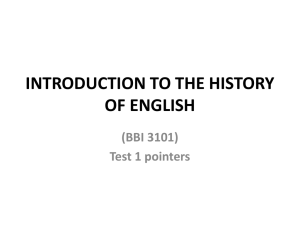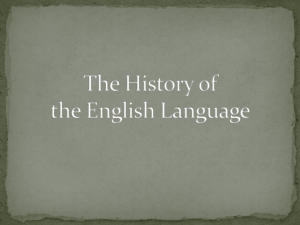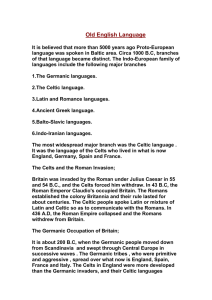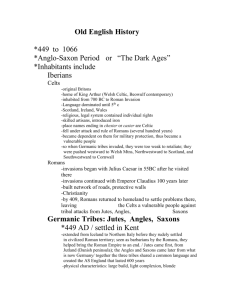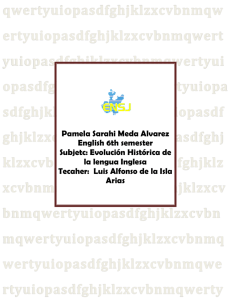English A Brief History of the Language
advertisement
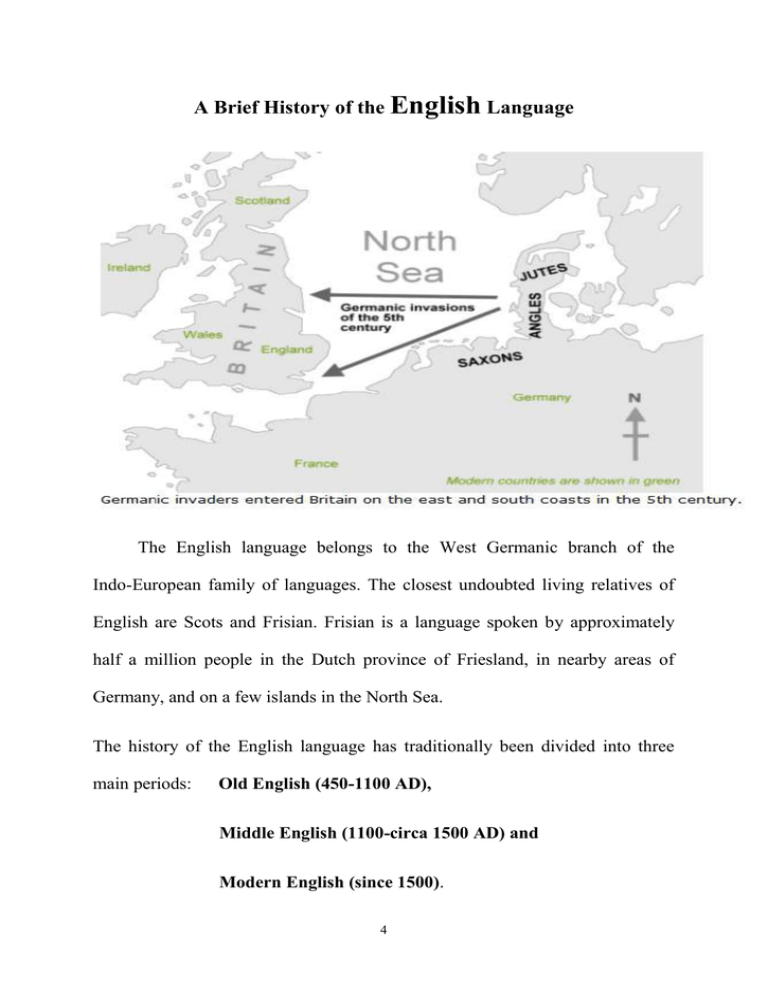
A Brief History of the English Language The English language belongs to the West Germanic branch of the Indo-European family of languages. The closest undoubted living relatives of English are Scots and Frisian. Frisian is a language spoken by approximately half a million people in the Dutch province of Friesland, in nearby areas of Germany, and on a few islands in the North Sea. The history of the English language has traditionally been divided into three main periods: Old English (450-1100 AD), Middle English (1100-circa 1500 AD) and Modern English (since 1500). 4 Over the centuries, the English language has been influenced by a number of other languages. Old English (450 - 1100 AD):Historical Events During the 5th Century AD three Germanic tribes (Saxons, Angles, and Jutes) came to the British Isles from various parts of northwest Germany as well as Denmark. These tribes were warlike and pushed out most of the original, Celtic-speaking inhabitants from England into Scotland, Wales, and Cornwall. One group migrated to the Brittany Coast of France where their descendants still speak the Celtic Language of Breton today. When the Anglo-Saxons first came to England from northern Germany (Saxony) in the fifth and sixth centuries, they brought their language with them. It is a Germanic language and has some fundamental similarities to Modern German Through the years, the Saxons, Angles and Jutes mixed their different Germanic dialects. This group of dialects forms what linguists refer to as Old English or Anglo-Saxon. The word "English" was in Old English "Englisc", and that comes from the name of the Angles. The Angles were named from Engle, their land of origin. Before the Saxons the language spoken in what is now England was a mixture of Latin and various Celtic languages which were spoken before the Romans came to Britain (54-5BC). The Romans brought Latin to Britain, which was part 5 of the Roman Empire for over 400 years. Many of the words passed on from this era are those coined by Roman merchants and soldiers. These include win (wine), candel (candle), belt (belt), weall (wall). ("Language Timeline", The British Library Board) The influence of Celtic upon Old English was slight. In fact, very few Celtic words have lived on in the English language. But many of place and river names have Celtic origins: Kent, York, Dover, Cumberland, Thames, Avon, Trent, Severn. The arrival of St. Augustine in 597 and the introduction of Christianity into Saxon England brought more Latin words into the English language. They were mostly concerned with the naming of Church dignitaries, ceremonies, etc. Some, such as church, bishop, baptism, monk, eucharist and presbyter came indirectly through Latin from the Greek. Around 878 AD Danes and Norsemen, also called Vikings, invaded the country and English got many Norse words into the language, particularly in the north of England. The Vikings, being Scandinavian, spoke a language (Old Norse) which, in origin at least, was just as Germanic as Old English. Words derived from Norse include: sky, egg, cake, skin, leg, window (wind eye), husband, fellow, skill, anger, flat, odd, ugly, get, give, take, raise, call, die, they, 6 their, them. ("The Origin and History of the English Language", Kryss Katsiavriades) Several written works have survived from the Old English period. The most famous is a heroic epic poem called "Beowulf". It is the oldest known English poem and it is notable for its length - 3,183 lines. Experts say "Beowulf" was written in Britain more than one thousand years ago. The name of the person who wrote it is unknown. ` 7 Some Characteristics of Old English After the Anglo-Saxon invasion, the Germanic language displaced the indigenous Brythonic languages and Latin in most of the areas of Great Britain that later became England. The original Celtic languages remained in parts of Scotland, Wales and Cornwall (where Cornish was spoken into the 19th century), although large numbers of compound Celtic-Germanic place names survive, hinting at early language mixing. Latin also remained in these areas as the language of the Celtic Church and of higher education for the nobility. Latin was later to be reintroduced to England by missionaries from both the Celtic and Roman churches, and it would, in time, have a major impact on English. What is now called Old English emerged over time out of the many dialects and languages of the colonizing tribes. Even then, Old English continued to exhibit local variation, the remnants of which continue to be found in dialects of Modern English.[4] The most famous surviving work from the Old English period is the epic poem Beowulf composed by an unknown poet. The pronunciation of Old English words differs somewhat from that of Modern English words. Especially the long vowels have changed a great deal. Take the Old English word stān for example. The word stān is the same word as the Modern English word stone, but the vowel is different, The a sound has 8 shifted to the sound of o in Modern English. Other vowels have also undergone changes, e.g. fōt (Old English ) —— foot (Modern English) cēne (Old English ) —— keen (Modern English) hū (Old English ) —— how (Modern English) Old English represented the sound of th by p and ð as in the word wiρ (O. E.) — with (Mod. E.), and the word ðā (O. E.) — then (Mod. E.), the sound of sh by sc as in scēap (O. E.) — sheep (Mod. E.) or scēotan (O. E.) — shoot (Mod. E.), and the sound of k by c as in — kin (Mod. E.) or cynn (O. E.) nacod (O. E.) — naked (Mod. E.). The vocabulary of Old English consisted mainly of Anglo-Saxon words. But when the Norman Conquest in 1066 brought French to England much of the English vocabulary was replaced by words borrowed from French and Latin. If we open any Old English dictionary, we find that about 85 percent of the Old English vocabulary was no longer in use during this period. Of course, the basic elements of the vocabulary have remained. They express fundamental concepts of human life, such as: wīf (wife), mann (man); bern (bench), cild (child), mete (meat , food) , fugol (fowl, bird), gærs (grass), hēah (high), gōd (good), 9 hūs (house), lēaf (leaf) , strang (strong), etan (eat), drincan ( drink ), slæpan (sleep ), libban (live ) . feohtan (fight), etc. declensions and conjugations.: Old English was a highly inflected language. It had a complete system of declensions with four cases and conjugations. So Old English grammar differs from Modern English grammar in declensions and conjugations. There are two classes of languages in the world: synthetic and analytic. A synthetic language is one which shows the relation of words in a sentence largely by means of inflections. An analytic language is one which indicates the relation of words in a sentence by means of word order, prepositions or auxiliary verbs, rather than by inflections. Old English is a synthetic language. Old English nouns and adjectives have four cases: the nominative case, the genitive case, the dative case and the accusative case. Apart from these four cases, Latin nouns have the ablative and the locative cases. That is to say, Latin nouns have six cases just like Modern Russian nouns. In Modern English, a noun used as a subject and object does not have different forms. There remain today only two case forms: those of the nominative case and the possessive case: man, man’s. Modern English depends upon word order to show the relation of words in a sentence. Different word 10 order may result in different meaning. The sentence “Nero killed Agrippina.” is completely opposite to the sentence “Agrippina killed Nero.” in meaning. (Lin Chenzhang. 1997. An introduction to English lexicology Wuhan University Press.) 11
